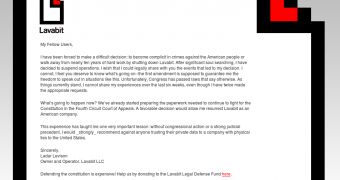Lavabit owner Ladar Levison has made a lot of friends by refusing to cooperate with the government when they demanded the site’s SSL keys, including the Electronic Frontier Foundation.
According to briefs written by attorneys for three groups in support of Levison's legal battle, the government’s use of subpoenas to compromise an encrypted email service is unreasonable and unnecessary.
“This is like trying to hit a nail with a wrecking ball,” attorneys of the EEF have said, arguing in favor of Lavabit.
As a recap, Lavabit had been pursued by federal agents for months, as they tried to get the company to hand over the site’s SSL keys, something which would expose not only Snowden’s emails, but also those of over 400,000 customers around the globe.
Levison, however, decided to shut down the site rather than endanger all his customers and proceeded to take the fight to court.
Attorneys of ACLU argue that the Congress has refrained from requiring providers such as Lavabit to design their services in a way that enables the government to easily access the user data, but that didn’t stop the agencies from asking Lavabit to hand over its SSL keys.
They further argue that encrypted online communications are the backbone of the modern Internet. “By forcing Lavabit to turn over its private keys, the government not only disrupted the security model on which the Internet depends, it also violated the Fourth Amendment,” the EFF attorneys wrote.
It’s not only email services that are at risk, but basically any site that is widely used. “In the case of Facebook, having the private key used by the company would give unfettered access to the personal information of almost 20 percent of all of the human beings on the planet obtained through the Facebook site for three years,” another passage reads.
All of them agree on one point, however: the subpoena sent to Lavabit was unconstitutional, since it violates the Fourth Amendment.

 14 DAY TRIAL //
14 DAY TRIAL //